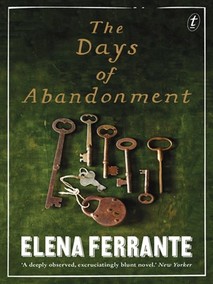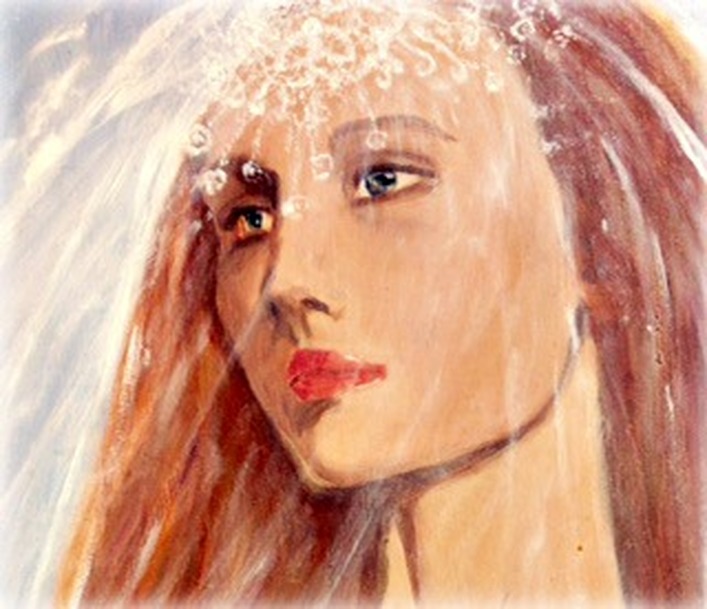Unveiling Elena Ferrante World famous author Elena Ferrante was not on my radar until an editor put The Days of Abandonment into my hands and said: “No-one knows who she is. Except her publisher.” Really? At home I opened Ferrante’s novel and was swept up in the story of Olga, and a voice that I had never before encountered in literature, not like this, not so pure, nor raw, nor so comprehensive. From its pages unspooled a kind of female darkness, a rage, startling in its consistency and in its near-flawless execution. And though I’d never read anything quite like it, the voice was familiar; it was the voice of friends weeping in cafes; of wives screaming in helpless fury at philandering husbands, the hurt and outrage of a woman passed over and sinking into invisibility. Olga’s emotions are so extreme they teeter on madness and they’re laced with poison too - the vengefulness of the woman scorned. That phrase is of course familiar; we all know that there’s something true about it, but it’s another thing to see it fully realised on the page, page after page, till you find yourself hoping that Olga can pull herself together. I saw immediately how anonymity might make such writing possible, indeed, might even be its foundation stone. It is, as Virginia Woolf said, a refuge for female writers: “Anonymity runs in their blood. The desire to be veiled possesses them.” Ferrante's stayed anonymous for seven novels, including the bestselling Neapolitan quartet, and has managed to avoid the personal aspect of marketing that most creators have to participate in, for worse or better. A recent article by Konrad Marshall in The Age's Good Weekend touched on my own ambivalence about this: “Today we are all brands. We define our philosophy by what we retweet. We refine our image with the perfect selfie…We curate our reality through the comments, shares and likes we bestow on Facebook..." All this endless, self-conscious curating! Self-consciousness - and its close friend, self-censorship, and its flip side, self-doubt - these can so easily block creativity. We are not brands, though our works might be. Branding is a shortcut between reader and writer, between audience and artist, part of the public transaction; one has to switch gears cleanly between one and the other. But sometimes it’s not quite possible. Author Nikki Gemmell found she could not write her 2003 novel, The Bride Stripped Bare, until she permitted herself to publish anonymously. She’d read Woolf’s statement that for most of history “Anonymous was a woman.” “And with that simple sentence, my recalcitrant novel was unlocked.” (She was unmasked before her book even went to print, to her great distress.) Elena Ferrante told her publishers at the start of her career that if books had something to say, they would sooner or later find readers: “I very much love those mysterious volumes, both ancient and modern that have no definite author but have had and continue to have an intense life of their own.” Twenty years later Ferrante remained, till last week, a celebrated writer who’d managed to keep her veil, engaging with her readers purely through her art as Saul Bellow and many others also have preferred or would prefer, if they had the choice. Yes! What luxury, what joy, to communicate purely through an artistic language of one’s own devising! And while as a reader I'm fascinated by biography, it seems to me as a writer that to communicate only through art should be possible. And so I felt, as did many, protective of her secrecy. Years ago, I drew a simple cartoon: an angel, labelled ‘Art’ stood in the path of a huge truck labelled ‘Commerce,’ and I thought of it last week when I read that Graeme Simsion, author of The Rosie Project, had been warned that his new novel might damage the Rosie brand. What? A writer has success and then is stranded in the straitjacket of his brand? Are we losing sight of what art is? To behold a free woman who uses a veil at will is powerful experience, according to Clarissa Pinkola Estés, author of Women Who Run With Wolves. Estés describes seeing, when she was eight, her cousin preparing for her wedding. When she put on the veil, she became remote, immortal: “She was only of herself, contained and powerful, and just out of reach in a right way.” This was part of Ferrante’s achievement. But Ferrante, it would seem, is no longer out of reach. Investigative journalist Claudio Gatti claimed last week that Elena Ferrante was an Italian translator, based mostly on financial evidence. Citing Ferrante’s quote that she would use lies ‘to shield my person’ when necessary, Gatti claims that the author has: “in a way relinquished her right to disappear behind her books and let them live and grow while their author remained unknown.” There was a mystery, said Gatti, and he went after it. And perhaps this is what's so objectionable about the whole affair. A journalist is hunting and uncovering one kind of truth, while a novelist may be working to reveal something more ephemeral. In this particular case, the journalist has destroyed the protective condition the novelist finds necessary explore these emotional truths. Milan Kundera writes in The Art of the Novel that novels are a form of inquiry into different aspects of existence; such as the tedium of everyday life in Flaubert's Madame Bovary. But maybe this kind of novelistic intelligence is less graspable in our cultural landscape, as Kundera suggests: "Every novel says to the reader: “Things are not as simple as you think.” That is the novel’s eternal truth, but it grows steadily harder to hear amid the din of easy, quick answers that come faster than the question and block it off. In the spirit of our time, it’s either Anna or Karenin who is right, and the ancient wisdom of Cervantes, telling us about the difficulty of knowing and the elusiveness of truth, seems cumbersome and useless.” Pseudonyms are fragile, (and sometimes constructed to deceive, as in our own history of Helen Darville, Wanda Koolmatrie, Elizabeth Durack and the infamous Ern Malley hoax) and so maybe Ferrante’s unmasking was inevitable. Our age doesn’t permit mysteries. If anyone veils anything, it’s ripped off. Half the time it’s ourselves , giving up our details to corporations for delicious new apps, posting our own images, obeying magazine articles urging us to turn ourselves into brands. In France, burqas are literally banned. There's a rumour that Pokemon Go is really about mapping every last secret space on the planet. And when it comes to artists, one of our central preoccupations seems to be matching the biography to the work. Ah yes, we say, this author writes about poverty so beautifully because she grew up with a single mother. And so on. We seek evidence for brilliance in the material realm, in facts, rather than in the imagination. But what has transpired this week is that many readers, and other writers, are just as invested in her anonymity as Ferrante herself. It was part of her contract with the world. Ferrante was that rarest of things; a celebrated artist who was anonymous. The tearing away of her veil is not just a loss for her, but for all creators everywhere.
0 Comments
|
AuthorWelcome to my blog about writing, books, arts, ideas and events. Archives
December 2020
Categories |


 RSS Feed
RSS Feed